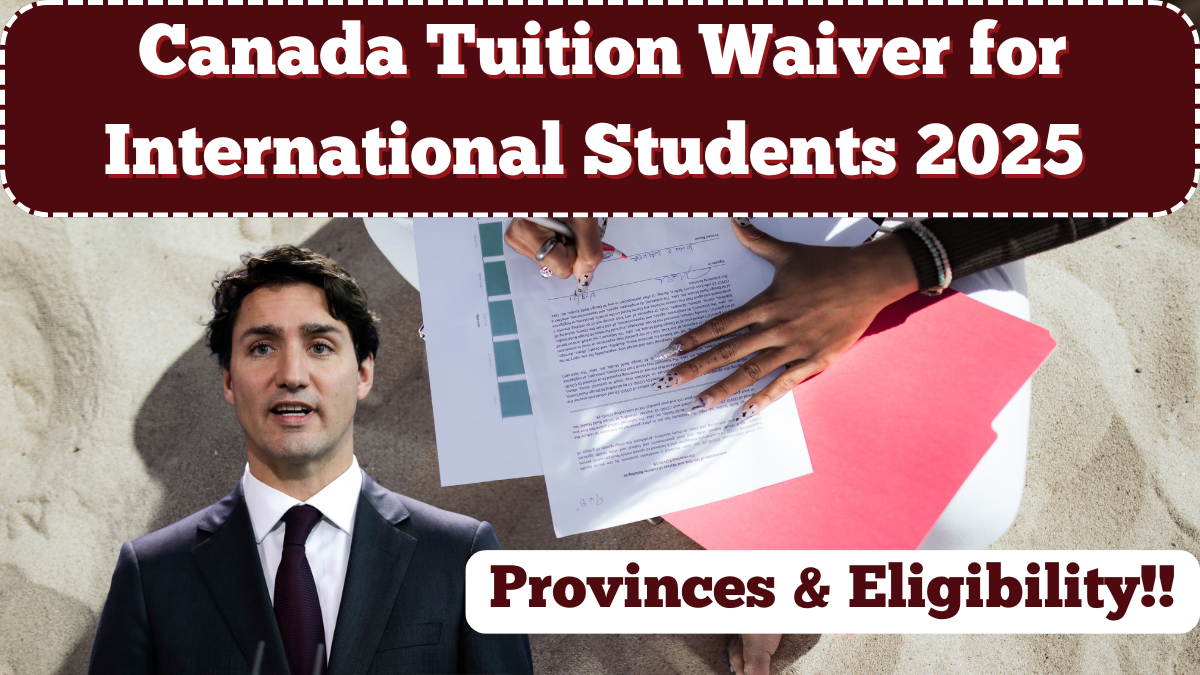The Canada International Student Fee Waiver has been officially implemented in 2025 across select provinces, bringing massive relief for global students pursuing higher education. This new policy is part of a broader effort to attract and support deserving students from developing nations while addressing skilled labour shortages in Canada.
As of June 2025, the Canada International Student Fee Waiver applies to eligible students studying in designated post-secondary institutions in provinces like Manitoba, Nova Scotia, and Newfoundland & Labrador. These provinces will now cover full or partial tuition fees for selected international students under specific eligibility brackets.
This progressive move helps reduce the cost of education, promotes diversity in Canadian campuses, and strengthens global academic partnerships.

Provinces Offering Tuition Waivers in 2025
Under the 2025 plan, the Canada International Student Fee Waiver is currently active in the following provinces:
-
Manitoba: 100% tuition waiver for students in healthcare, STEM, and education programs
-
Nova Scotia: Waiver available for first-year undergraduate international students
-
Newfoundland & Labrador: Covers up to 70% of tuition fees for students from South Asia, Africa, and Latin America
Each province has its own funding cap and academic performance requirements. However, all participating provinces require that students remain in the province for a minimum of 2 years post-graduation as part of a retention policy.
Who Qualifies for the Tuition Waiver?
To benefit from the Canada International Student Fee Waiver, students must meet a clear set of eligibility requirements:
-
Be a first-time international applicant to a public college or university in the eligible province
-
Hold a valid Canadian study permit
-
Demonstrate academic excellence (minimum 75% average in previous education)
-
Provide proof of financial need or limited access to education in their home country
-
Commit to living and working in Canada post-graduation (depending on province)
Some universities also offer priority to female applicants, refugees, and students from rural or conflict-affected regions.
Covered Programs and Institutions
The Canada International Student Fee Waiver applies mainly to publicly funded institutions. Some examples include:
| Province | Participating Institutions | Covered Programs |
|---|---|---|
| Manitoba | University of Manitoba, Red River College | Nursing, Engineering, Teaching |
| Nova Scotia | Dalhousie University, Cape Breton University | Arts, Business, Health Sciences |
| Newfoundland & Labrador | Memorial University | Technology, Environmental Studies |
Graduate-level courses and professional diplomas are also eligible in some provinces.
How to Apply for the 2025 Fee Waiver
Applications for the Canada International Student Fee Waiver are processed through the individual institution’s admission portal. Here’s how it works:
-
Apply to the institution as an international student
-
Submit the tuition waiver application along with required documents (income proof, transcripts, visa copy)
-
Await approval before confirming your enrollment
Most decisions are made within 3 to 5 weeks, and the waiver is reflected in the tuition invoice at the time of payment.
FAQs
What is the Canada International Student Fee Waiver 2025?
It’s a new tuition waiver program launched by Canadian provinces in 2025 to help reduce education costs for international students.
Which provinces are offering this fee waiver?
Currently, Manitoba, Nova Scotia, and Newfoundland & Labrador are participating in the waiver program.
Who can apply for the Canada International Student Fee Waiver?
Eligible applicants must be first-time international students, hold a valid study permit, and meet academic and income criteria.
Does the waiver cover full tuition fees?
In Manitoba, full tuition is waived; in other provinces, partial waivers (50%–70%) are offered depending on the program and applicant profile.
Can postgraduate students apply for the waiver?
Yes, some provinces allow tuition waivers for master’s or professional diploma programs, especially in in-demand sectors.
Will I need to stay in Canada after completing my course?
Yes, most provinces require students to live and work locally for at least 2 years post-graduation as part of their retention strategy.
Click here to know more.
